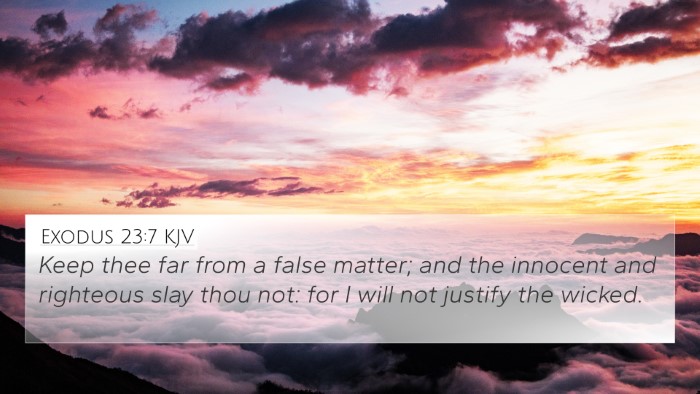Understanding Proverbs 4:15
Verse: “Avoid it, do not go on it; turn away from it and pass on.” (Proverbs 4:15)
Meaning and Interpretation
The wise teachings found in the Book of Proverbs advocate for discernment in the choices we make, emphasizing the significance of avoiding paths that lead to sin or moral corruption. In this verse, the imperative to “avoid it” underscores the necessity of refraining from engaging with evil influences or environments. This echoes the broader theme of wisdom literature, where the pursuit of wisdom calls for both understanding and action.
Key Insights from Public Domain Commentaries
- Matthew Henry: Henry emphasizes the personal responsibility of the believer in steering clear of temptation. His commentary urges individuals to recognize the dangers inherent in the allure of sin, portraying the directive to “turn away” as a proactive stance against moral failure.
- Albert Barnes: Barnes highlights the concept of guarding one's heart and mind. He notes that the physical act of turning away represents a spiritual commitment to remain on the righteous path, thus promoting holiness and spiritual integrity as foundational principles of a faithful life.
- Adam Clarke: Clarke reflects on the nature of the “path” mentioned in this verse. He elaborates that the paths of the wicked are often deceptively attractive, and the call to avoid them is crucial for maintaining one's spiritual well-being. Clarke connects this to a broader narrative about the importance of choosing virtuous friends and companions.
Cross-Referencing and Biblical Connections
When analyzing Proverbs 4:15, it is important to consider other scriptures that echo similar sentiments regarding avoidance of evil. Below are significant verses that create connections illustrating this theme:
- Psalms 1:1-2: “Blessed is the man who walks not in the counsel of the wicked…” - This underscores the importance of refraining from evil advice.
- Proverbs 1:10: “My son, if sinners entice you, do not consent.” - A direct admonition against yielding to temptation.
- Romans 12:9: “Abhor what is evil; cling to what is good.” - A New Testament affirmation of rejecting evil.
- 1 Thessalonians 5:22: “Abstain from every form of evil.” - This echoes the exhortation found in Proverbs to actively avoid sin.
- James 4:7: “Submit yourselves therefore to God. Resist the devil, and he will flee from you.” - A reminder of the active resistance against temptation that aligns with the overarching message of Proverbs 4:15.
- 2 Timothy 2:22: “So flee youthful passions and pursue righteousness…” - This verse reinforces the idea of turning away from harmful paths.
- Matthew 7:13-14: “Enter by the narrow gate...for the gate is wide and the way is easy…” - The contrast between paths of righteousness and those of destruction highlights the importance of choosing wisely.
Thematic Connections Across Scriptures
The message of avoiding harmful paths is a recurring theme throughout the Scriptures. The unity in these teachings invites a deeper analysis through thematic connections:
- Wisdom vs. Folly: Throughout Proverbs, the consistent portrayal of wisdom as a pursuit emphasizes choosing right over wrong, with Proverbs 4:15 representing a critical point of action.
- The Call to Righteousness: Various epistles, particularly in the New Testament, echo the necessity of turning away from evil and instead pursuing a life characterized by righteousness.
- Sin and its Consequences: Many verses outline the repercussions of straying from God’s commandments, thereby linking the consequences of sin to the call to avoid it in Proverbs 4:15.
Practical Application
Applying the lessons from Proverbs 4:15 involves both conscious decision-making and an internal commitment to spiritual integrity. Here are some ways to incorporate these principles into daily life:
- Identify specific influences or environments that lead you away from righteousness.
- Develop a practice of prayer and meditation focused on seeking discernment.
- Engage with a community that promotes spiritual growth and accountability.
- Utilize tools for Bible cross-referencing to enrich understanding of scriptural warnings and guidance.
Conclusion
Proverbs 4:15 serves as a powerful reminder of the imperative to avoid paths that lead to moral decay. By examining cross-references and linking it to the broader biblical narrative, believers are encouraged to pursue a life characterized by wisdom, righteousness, and steadfastness against temptation. Every step taken away from sin is a step closer to spiritual fulfillment, reflecting the heart of Proverbs' teachings.










